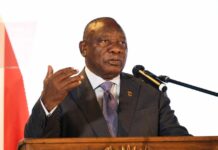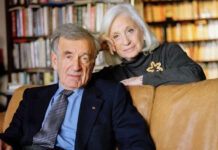The significance of two events that have been upstaged this week by the Hebrew media’s incessant coronavirus coverage cannot be overemphasized—particularly with the fast approach of the March 2 Knesset elections.
One was the rejection of an appeal by an activist in Bahrain sentenced to three years in prison for burning an Israeli flag during a pro-Palestinian protest last May. The other was the flight of an Israeli plane over the skies of Sudan.
Each occurred over the past weekend. Both indicate winds of change (one quite literal) in the Middle East, made possible through policies promoted by U.S. President Donald Trump and Israeli Prime Minister Benjamin Netanyahu, whose enhancing of ties with Arab leaders in the effort to keep the Islamic Republic of Iran’s regional and global hegemonic ambitions at bay is bearing fruit.
The Bahraini verdict comes amid the now-overt warming of ties between Manama and Jerusalem, which do not have official diplomatic relations. In October, for instance, Israeli Foreign Ministry counter-terrorism department head Dana Benvenisti-Gabay attended the “Working Group on Maritime and Aviation Security” conference in Bahrain. The gathering of 60 countries—co-hosted by Manama, Washington and Warsaw—was referred to by the Bahraini foreign ministry as “an occasion to exchange views on how to deal with the Iranian menace and to guarantee freedom of navigation.”
It is in the above context that Manama’s intolerance for the desecration of the Israeli flag can and should be understood.
Then there’s Sudan. On Feb. 3, Netanyahu had an unprecedented meeting in Uganda with Sudanese Sovereignty Council chairman Abdel Fattah al-Burhan—the country’s interim leader in the wake of the ouster of the brutal 30-year rule of president Omar al-Bashir—to discuss the future of diplomatic relations between Jerusalem and Khartoum.
“What happened in the meeting was merely a consensus between the two sides to halt all mutually hostile actions and positions,” Burhan told the state-run SUNA news agency after Netanyahu said that they had discussed full normalization. “The meeting did not deal with the details regarding the form of relations or what is specifically required to [establish them].”
Burhan also said, however, that the “picture for Sudan changed a lot after I met with Netanyahu,” and announced that he would give Israel permission to use Sudanese airspace for flights departing from and entering the Jewish state as long as they were not planes belonging to El Al, Israel’s national carrier.
The following day, Sudanese Armed Forces spokesman Brig. Gen. Amer Mohammed al-Hassan gave a press conference in which he explained that the purpose of Burhan’s meeting with Netanyahu was to persuade the United States to cancel Sudan’s decades-long designation as a state sponsor of terrorism. You know, since the Trump and Netanyahu administrations are such close allies.
Less than two weeks later, an Israeli plane, returning from Kinshasha in the Democratic Republic of Congo, flew over Khartoum en route to Ben-Gurion International Airport in Tel Aviv.
The fast-paced unfolding of such events—evidence of thawing anti-Israel enmity among states wishing to ally themselves with Trump against the ayatollah-led regime in Tehran—should be cause for great celebration in the so-called “peace camp.” But the “anybody-but-Bibi-and-Donald” crowd is incapable of seeing its hopes and dreams for a “New Middle East” realized by others—those with a wiser worldview, better priorities and policies that actually work.
It is this that Israelis would do well to remember in the less-than-two-week lead-up to election day. Instead, we are being bombarded with warnings and statistics surrounding the coronavirus, in spite of the country’s having no recorded cases of it so far.
Ruthie Blum is an Israel-based journalist and author of “To Hell in a Handbasket: Carter, Obama, and the ‘Arab Spring.’ ”


























